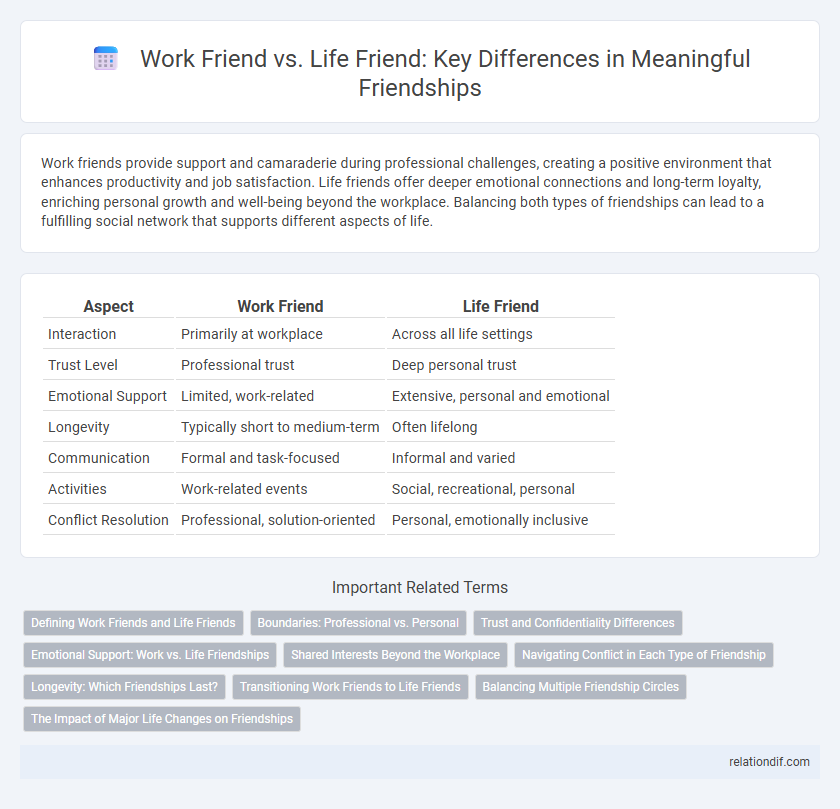Work friends provide support and camaraderie during professional challenges, creating a positive environment that enhances productivity and job satisfaction. Life friends offer deeper emotional connections and long-term loyalty, enriching personal growth and well-being beyond the workplace. Balancing both types of friendships can lead to a fulfilling social network that supports different aspects of life.
Table of Comparison
| Aspect | Work Friend | Life Friend |
|---|---|---|
| Interaction | Primarily at workplace | Across all life settings |
| Trust Level | Professional trust | Deep personal trust |
| Emotional Support | Limited, work-related | Extensive, personal and emotional |
| Longevity | Typically short to medium-term | Often lifelong |
| Communication | Formal and task-focused | Informal and varied |
| Activities | Work-related events | Social, recreational, personal |
| Conflict Resolution | Professional, solution-oriented | Personal, emotionally inclusive |
Defining Work Friends and Life Friends
Work friends are colleagues with whom you share professional tasks, develop trust through collaboration, and engage in workplace-related social interactions. Life friends go beyond the office environment, offering emotional support, deep personal connections, and shared experiences outside of work. Understanding the distinction between these friendships helps balance social needs in both professional and personal spheres.
Boundaries: Professional vs. Personal
Work friends typically maintain boundaries centered around professional interactions, keeping conversations and activities related to the workplace environment. Life friends, in contrast, share deeper personal connections that extend beyond work, involving emotional support, private experiences, and social activities. Clear distinctions in boundaries ensure work friends respect confidentiality and professionalism, while life friends foster trust and openness in personal matters.
Trust and Confidentiality Differences
Work friends often share trust within professional boundaries, maintaining confidentiality related to workplace matters and projects. Life friends hold deeper trust that extends beyond career, involving personal secrets, emotional support, and long-term confidentiality. The level of trust with life friends typically involves more vulnerability and sustained privacy compared to work friendships.
Emotional Support: Work vs. Life Friendships
Work friends often provide practical emotional support during stressful tasks or professional challenges, offering empathy rooted in shared workplace experiences. Life friends offer deeper, unconditional emotional support that extends beyond specific contexts, nurturing long-term mental well-being. Emotional support from life friends tends to be more holistic and enduring compared to the situational and task-oriented support typical of work friends.
Shared Interests Beyond the Workplace
Work friends often bond over projects, deadlines, and office culture, creating connections rooted in professional collaboration. Life friends, on the other hand, share deeper interests such as hobbies, values, and personal experiences that extend beyond the workplace environment. This distinction highlights how life friendships provide emotional support and common activities outside of work, enriching social fulfillment.
Navigating Conflict in Each Type of Friendship
Work friends often require clear boundaries and professional communication to navigate conflicts, ensuring that disagreements do not affect workplace dynamics or productivity. Life friends, by contrast, typically allow for deeper emotional expression and greater forgiveness, enabling resolution through empathy and long-term understanding. Recognizing the distinct communication styles and expectations in work versus life friendships is essential for maintaining healthy relationships in both contexts.
Longevity: Which Friendships Last?
Work friendships often center around shared tasks and professional goals, tending to fade when job roles or workplaces change. Life friendships, rooted in deeper emotional bonds and shared personal experiences, show greater resilience and longevity across different life stages. Research indicates that emotional closeness and mutual support strongly predict the lifespan of friendships beyond situational contexts.
Transitioning Work Friends to Life Friends
Transitioning work friends to life friends requires nurturing trust beyond professional boundaries through shared personal experiences and consistent communication outside the workplace. Emphasizing emotional support and vulnerability deepens the connection, transforming surface-level camaraderie into meaningful, lasting bonds. Prioritizing time together in diverse settings reinforces the relationship, ensuring it thrives beyond the constraints of the work environment.
Balancing Multiple Friendship Circles
Balancing multiple friendship circles involves recognizing the unique roles of work friends and life friends, where work friends provide immediate support and networking within a professional environment, while life friends offer deeper emotional connection and long-term trust. Navigating these relationships requires setting boundaries and managing expectations to maintain harmony and prevent conflicts between personal and professional spheres. Prioritizing quality interactions across both circles enhances social well-being and strengthens overall support networks.
The Impact of Major Life Changes on Friendships
Major life changes such as marriage, relocation, or career shifts often strain work friendships due to decreased daily interactions and differing priorities. Life friends, who share deeper emotional bonds and long-term history, tend to provide more steadfast support during these transitions, offering emotional stability and continuity. Navigating these changes requires recognizing the distinct roles both work and life friends play in personal well-being and social support networks.
Work friend vs Life friend Infographic

 relationdif.com
relationdif.com